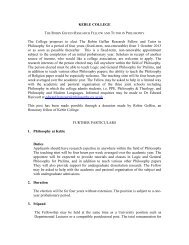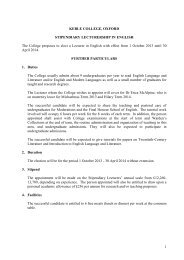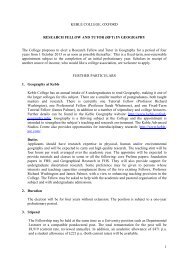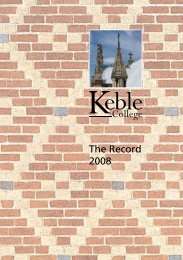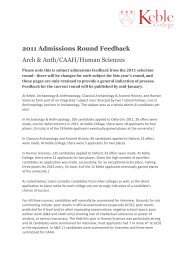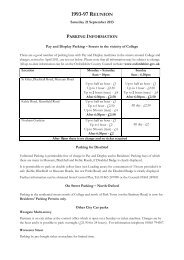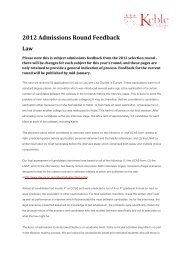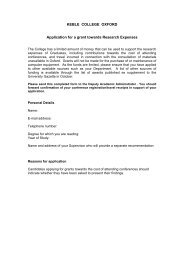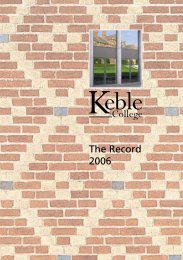The Record 2009 - Keble College - University of Oxford
The Record 2009 - Keble College - University of Oxford
The Record 2009 - Keble College - University of Oxford
You also want an ePaper? Increase the reach of your titles
YUMPU automatically turns print PDFs into web optimized ePapers that Google loves.
<strong>The</strong> Life <strong>of</strong> the <strong>College</strong><br />
to make the most out <strong>of</strong> Plutarch’s testimony and be able to rely<br />
on the information conveyed through his writings, it is essential<br />
to have a view about how reliable a reader <strong>of</strong> past philosophy<br />
Plutarch was. <strong>The</strong>refore, we have to examine more closely<br />
how he perceived and understood the theses he transmitted,<br />
how these theses fitted in (or not) with his own philosophical<br />
interests and beliefs and, eventually, how far his presentation <strong>of</strong><br />
them was plausible or distorted out <strong>of</strong> bias or lack <strong>of</strong> knowledge.<br />
<strong>The</strong> results <strong>of</strong> such an examination can be positively surprising<br />
and a personal anecdote may illustrate this well.<br />
When I finished reading for the first time Plutarch’s writing<br />
Against Colotes — a libel against an Epicurean devotee in<br />
which Plutarch literally demolishes Epicurean philosophy<br />
<strong>of</strong> nature and epistemology — my sympathies clearly lay<br />
with the Epicureans. Plutarch’s arguments seemed to me to<br />
be far too heated and rhetorical to be taken very seriously;<br />
obviously, I thought, Plutarch for whatever reasons despised<br />
Epicureanism and wished to give a biased presentation <strong>of</strong><br />
Epicurean philosophy that served his purpose <strong>of</strong> showing how<br />
utterly and dangerously mistaken Epicurus was. So I set out<br />
to expose Plutarch’s bias and vindicate Colotes, the Epicurean<br />
spokesman harshly criticized by Plutarch. <strong>The</strong>n a ‘turnaround’<br />
happened: the more I read Plutarch, trying to understand<br />
his arguments, the less confident I became <strong>of</strong> my sympathies<br />
with Epicureanism. <strong>The</strong> suspicion that Plutarch may have<br />
more to say through his arguments than what his apparently<br />
polemical rhetoric allowed us to think started creeping in and<br />
eventually turned into the conclusion <strong>of</strong> my doctoral thesis:<br />
Plutarch’s presentation <strong>of</strong> Epicureanism, despite the appearance<br />
<strong>of</strong> hostility and bias, <strong>of</strong>fers insightful readings <strong>of</strong> the Epicurean<br />
theories that may help us better understand Epicureanism and<br />
its place within the intellectual history <strong>of</strong> ancient Greece.<br />
In my postdoctoral research I have attempted to consolidate<br />
this initial inkling about the value <strong>of</strong> Plutarch’s readings <strong>of</strong><br />
past philosophical theories by examining more closely certain<br />
key passages from his work. This involves analysis <strong>of</strong> the<br />
main line <strong>of</strong> thought underlying Plutarch’s interpretation <strong>of</strong> an<br />
ancient philosopher’s theory (for example, Democritus’ view<br />
that all there really is in the world are atoms and the void);<br />
comparisons with other ancient interpretations <strong>of</strong> the same<br />
theory (for example, by Aristotle), when possible, are also<br />
particularly illuminating and rewarding. <strong>The</strong> results <strong>of</strong> such<br />
examination, while not always ‘breath-taking’, show Plutarch<br />
to have produced philosophically interesting and plausible<br />
readings that can <strong>of</strong>ten be seen to anticipate the interpretations<br />
19




